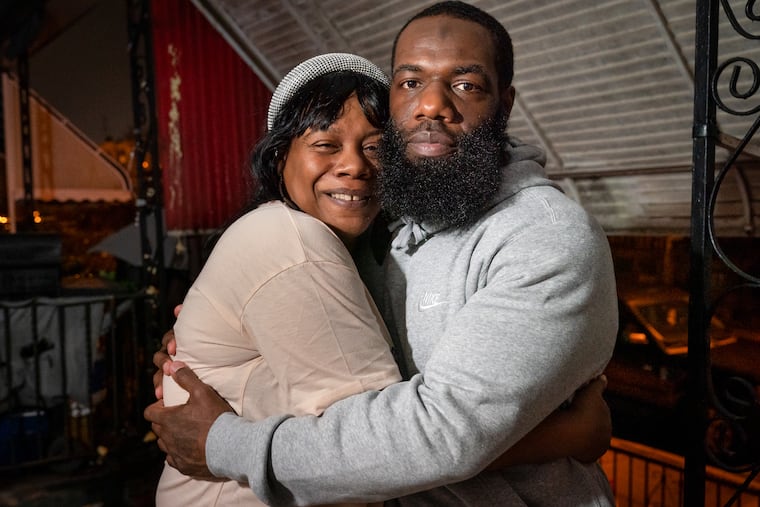Second exoneration in a week tied to misconduct by fired Philly homicide detective
Christopher Goodwin was incarcerated more than a decade for murder, even though the two eyewitnesses at his trial recanted and said they were coerced by Detective James Pitts.

For the second time in a week, a murder case involving allegations of misconduct by former Philadelphia homicide detective James Pitts, who is facing perjury charges, has ended with an exoneration.
Christopher Goodwin, 32 — who had served more than a decade in prison for the 2011 murder of Dwayne “Shank” Isaacs, 48, in South Philadelphia’s Wilson Park projects — was released from the State Correctional Institution Coal Township on Thursday.
Last July, U.S. District Judge Timothy Savage overturned Goodwin’s conviction, which was built on recanted statements by two witnesses who alleged abuse by Pitts. In ordering prosecutors to either release or retry Goodwin, Savage found that Philadelphia prosecutors had improperly withheld Pitts’ record of misconduct dating back to 2002, along with police Internal Affairs findings that called his credibility into question.
The Philadelphia District Attorney’s Office had for years opposing Goodwin’s petitions as “meritless.” But in May 2022 — a year after The Inquirer featured Goodwin’s case in an investigation into Pitts’ misconduct — prosecutors agreed that the conviction was unconstitutional. On Thursday, prosecutors finally dropped charges, conceding that they did not have enough evidence to retry Goodwin.
» READ MORE: Dozens accused a detective of fabrication and abuse. Many cases he built remain intact.
“There is a constitutional violation, and this is a wrongful conviction,” Katherine Ernst, the incoming supervisor of the DA’s federal litigation unit, said.
Goodwin’s is at least the 10th case involving Pitts that has been dropped, dismissed, or overturned. The detective is now facing charges including perjury in connection with the trial of Obina Onyiah, a man who said Pitts beat him until he confessed to murder. Onyiah was exonerated in 2021, based on an expert analysis of surveillance video that concluded he could not have been the gunman. The city has paid out more than $3 million to settle lawsuits naming Pitts, whom a grand jury found to have employed “habitually coercive interrogation techniques.”
» READ MORE: Convicted of killing a WWII vet as a teen, Philly woman is cleared. Police acted in ‘bad faith,’ DA says.
Speaking by phone Thursday, Goodwin said he was grateful to be reunited with his family, including his 13-year-old daughter, but angered by what he views as a broken justice system.
“It shows that there’s no accountability,” he said. “It took me all these years to fight these issues, and [this evidence] was in their face the whole time.”
At Goodwin’s trial, the jury heard from the two eyewitnesses that they were questioned for more than 12 hours, and faced threats and even assault.
In a 2021 interview with The Inquirer, one of the witnesses, Andre Cunningham, said Pitts choked him, threw him around so hard he tore his shirt, left him in the interview room so long he fell asleep, and then slammed phone books on the table next to his head. Cunningham said that, contrary to the statement he ended up signing after 18 hours of questioning, he knew Goodwin to be innocent because he saw him sitting on a stoop nearby at the time of the shooting.
» READ MORE: Lawyers say Philly cops coerced a man to confess to murder. He’s cleared after 10 years.
But Pitts’ name was not mentioned on Cunningham’s interview record. Detectives Thomas Gaul and John Verrecchio testified that there had been no coercion or physical abuse, and the jury believed them.
The federal judge concluded that the jury might have ruled differently if it had access to Pitts’ Internal Affairs file. It included a 2012 incident in which Pitts took an 84-year-old grandfather of a potential murder witness into custody without cause and then left for the day, and another incident in 2013 involving a murder witness whom Pitts kept in the Homicide Unit for 47 hours with no food but a pretzel and a soda, and no way to arrange child care for her son.
“If the contents of Detective Pitts’s IA file had been disclosed,” a magistrate judge wrote in a report adopted by Savage, “there is reason to believe that the jury would have found neither witness statement identifying [Goodwin] as the shooter credible in light of the allegations of coercion.”
Matthew Stiegler, the Philadelphia DA’s outgoing supervisor of federal litigation, said that after the case was overturned the DA’s Office had undertaken an extensive case review before agreeing to drop charges. They informed the victim’s surviving relatives, he said. Attempts by The Inquirer to reach Isaacs’ family on Thursday were not successful.
For Hassan Bennett, Goodwin’s victory was bittersweet. Bennett spent a decade in prison for a 2006 murder investigated by Pitts before being acquitted at retrial, and now serves on the Citizens Police Oversight Commission. He recalled meeting Goodwin in prison around 2015, and discovering startling similarities in the allegations of misconduct made in both of their cases.
» READ MORE: Innocent people have served decades in Pa. prisons. Here’s how to stop it from happening.
“We got to act faster,” Bennett said. “Around 2016 he put his first petition in, and here we are 2023. Six years later and he’s finally getting released. How many more people is it? And how long is the justice system going to … deny people justice who are suffering because of [Pitts’] actions?”
Goodwin, on his way back to Philadelphia on Thursday night, said he was ready for a new start.
“I’m taking every moment in right now,” he said. “I’m trying to build a foundation for me and my daughter — that’s my next plan. I’m just taking it day by day. I don’t know what’s out here for me.”